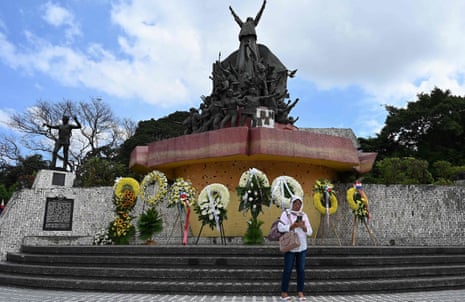The Philippine president, Ferdinand Marcos Jr, has dropped a public holiday marking the anniversary of a revolution that toppled his dictator father, further fuelling concerns his family is seeking to “whitewash” history.
Ferdinand Marcos Sr ruled the Philippines for more than two decades until he was ousted by the peaceful People Power Revolution of February 1986, when hundreds of thousands took to the streets. The Marcos family was forced to flee the country, and sought exile in Hawaii.
Later, 25 February was declared a “special national holiday” and is normally marked with rallies held by rights activists and survivors of martial law, which was imposed during Marcos Sr’s rule.
Many questioned whether Marcos Jr, who came to power in June last year, would maintain the holiday. He has been criticised for downplaying his father’s abuses and his election victory was driven by an onslaught of online disinformation that portrayed Marcos Sr’s time as a golden era, despite atrocities and corruption being widespread.
Thousands of political opponents were tortured, arrested and disappeared during Marcos Sr’s time in office, while as much as $10bn (£8bn) was plundered.
This year, the holiday was moved to a Friday, while a presidential proclamation listing holidays for 2024 omits the anniversary entirely.
Project Gunita, a group that is digitising documents and stories related to Marcos Sr’s rule, condemned the decision to drop the public holiday, describing it as “another state-sponsored attempt to whitewash the history of the brutal dictatorship of Ferdinand Marcos Sr”.
“Even if the government of Marcos the son strips EDSA 1986 of any official recognition, the people’s commemoration next year will matter more,” it said, referring to another name for the revolution.
The rights group Karapatan told Agence France-Presse that its removal showed the Marcos administration’s contempt for “meaningful social actions that pursue justice, truth and accountability”.
In a statement, Marcos’s office said it “maintains respect for the commemoration of the EDSA People Power Revolution” but that the date was not included as a non-working holiday because it fell on a Sunday.
“There is a minimal socioeconomic impact in declaring such day as a special non-working holiday since it coincides with the rest day for most workers/labourers,” the statement said.
However, many noted that a special non-working day was maintained for the feast of the immaculate conception, which also falls on Sunday.








